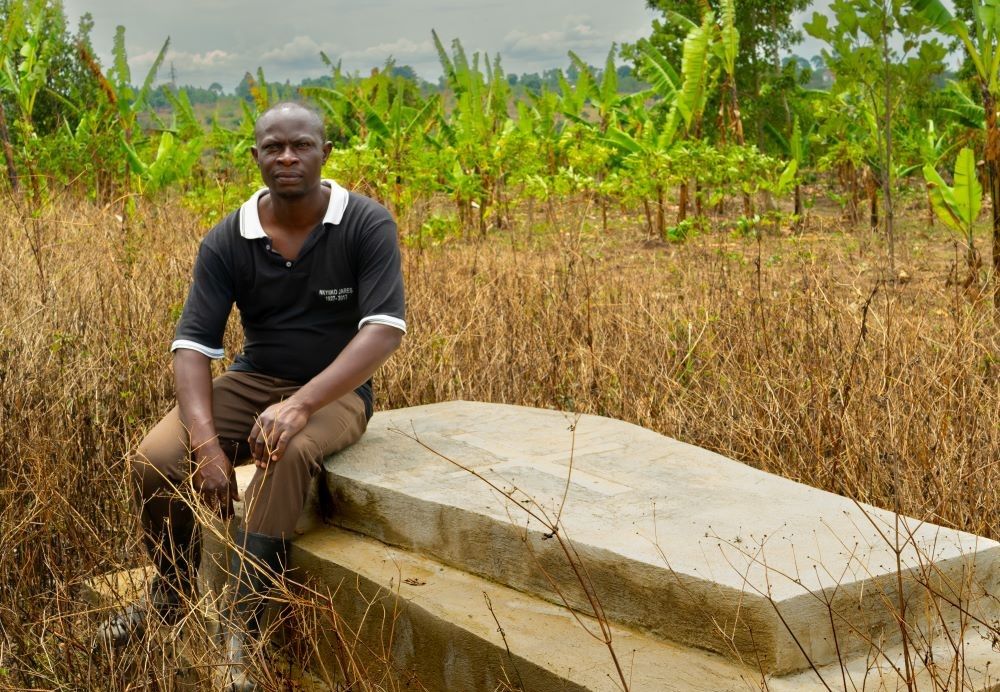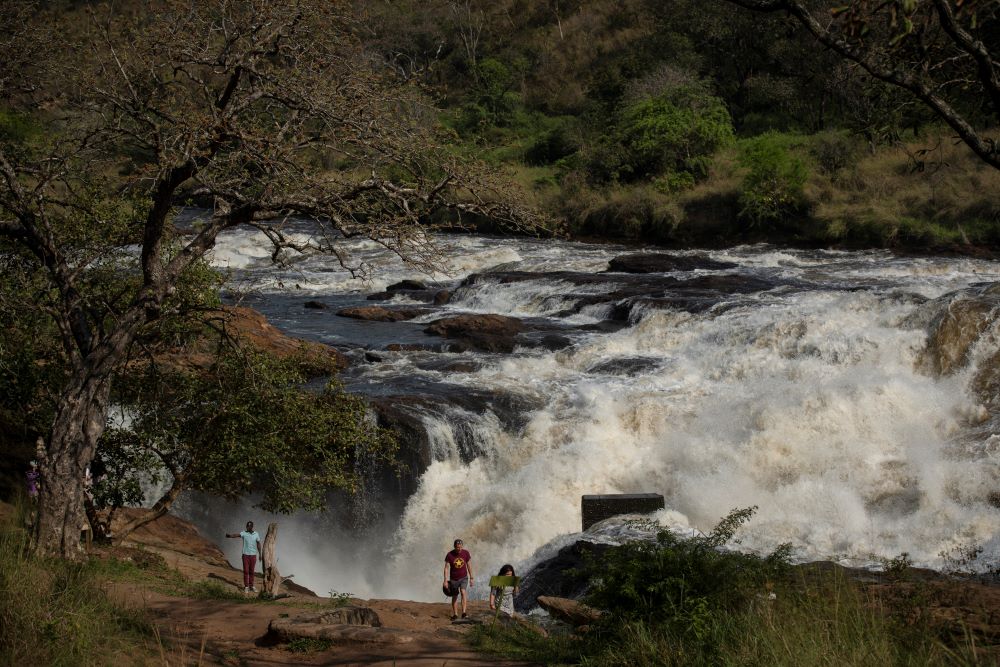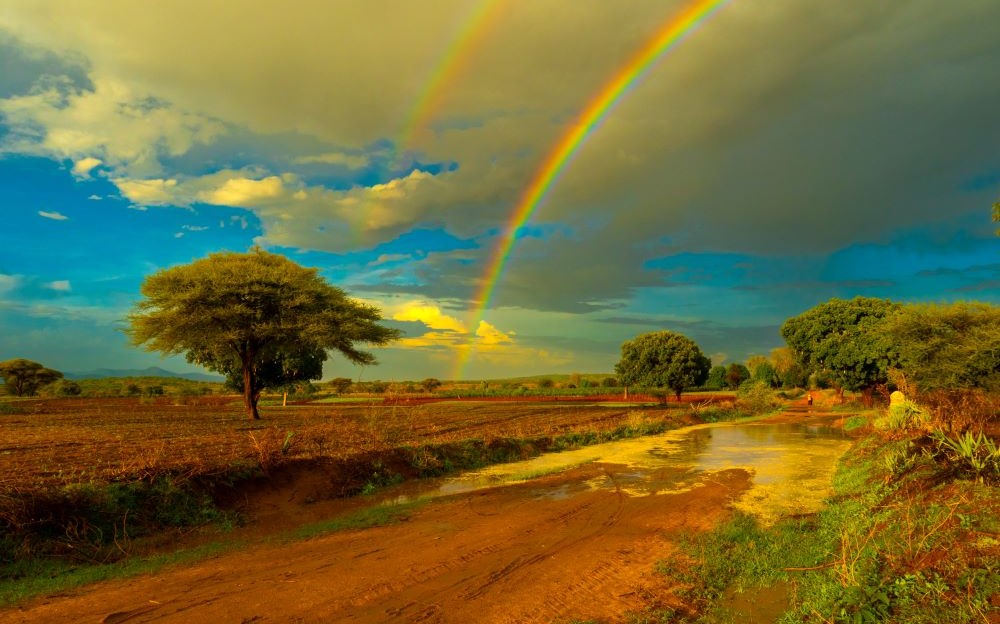
Robert Lule sits on an ancestral grave in Greater Massaka Area, Uganda, which lies in the current EACOP pipeline route. Local residents told GreenFaith that TotalEnergies has disturbed and disrespected the graves of their families and ancestors at numerous sites. (Courtesy of GreenFaith/Thomas Bart)
A major international oil pipeline project in East Africa will disturb more than 2,000 gravesites across two countries, according to a report from the interfaith environmental organization GreenFaith.
The East African Crude Oil Pipeline (EACOP) is being developed primarily by French oil company TotalEnergies, with a Chinese oil company and the governments of Uganda and Tanzania. The project would span roughly 900 miles and carry oil from western Uganda into Tanzania to a port on the Indian Ocean. Expected to come online by 2025, the pipeline's proposed route passes near Lake Victoria, an important freshwater source for millions, and its exploration and drilling sites are located around Lake Albert and several national parks and wildlife preserves.
For years, EACOP has been the focus of fierce protests and opposition from environmental groups, including faith-based ones, who say the pipeline — which would be the world's longest transporting heated oil — undermines global goals to combat climate change and threatens to destroy vital ecosystems and displace thousands of communities living along its path. The 35-page report from GreenFaith now alleges the threat also extends to the dead.
EACOP Ltd., which represents project partners, including TotalEnergies, "categorically rejects" the allegations made in the GreenFaith report.
GreenFaith's report, released Nov. 9, cites documents from TotalEnergies that indicated the oil project — encompassing the exploration sites, refineries and the pipeline itself — would disturb 1,031 graves in Uganda and 1,049 graves in Tanzania. The authors of the report reviewed public documents from TotalEnergies, from January 2018 through March 2021, and conducted field surveys and interviews with local impacted communities.
The disturbances described in the report amount to "spiritual assault," GreenFaith said. Among them:
- removing graves from traditional burial sites;
- splitting or separating burial sites;
- forcing living relatives to move away from family graves or to have reduced access to graves;
- physical damage to gravesites;
- disrespect of religious and traditional burial customs;
- and anxiety and loss of traditional culture.

Tourists walk at the top of the waterfalls in Murchison Falls National Park, northwest Uganda, on Feb. 22, 2020. The East African Crude Oil Pipeline goes through part of the park. (AP)
The report states that the majority of grave relocations have already taken place.
"TotalEnergies must recognize the sanctity of life and protect it," five faith leaders from Tanzania and Uganda said in a statement GreenFaith released with the report. "We demand justice for the affected. We demand the well-being of our communities and the environment. We demand an end to EACOP because of the severe spiritual and psychological harm it has and continues to cause families that bear the weight of allowing their loved ones' remains to be mistreated in those unmarked graves on EACOP's route."
GreenFaith joined in calling for "the immediate abandonment" of the EACOP project and urged other religious communities to do so as well. In addition, the group said that TotalEnergies must follow international best practices relating to grave relocation and honoring religious and cultural needs, repair any damages to already relocated graves, and reimburse communities that have faced financial losses.
"Treating the graves of local communities with such disregard is nothing less than colonialist behavior. No country or corporation would dare to endorse such behavior publicly. Yet it has happened and continues to happen," Rev. Fletcher Harper, GreenFaith executive director, wrote in the report's preface.
In a six-page letter sent to the faith group Nov. 15, Martin Tiffen, managing director of EACOP Ltd., responded to each of the seven main points outlined in the report. He said that to date the project has identified 1,780 graves for relocation (656 in Uganda and 1,124 in Tanzania) and that 97% have been completed. He disputed that international standards were not followed or cultural and religious customs honored in identifying and relocating graves, and noted examples of cases where the pipeline's route was modified to avoid gravesites.
"We carry out our activities, including the sensitive and delicate matter of graves relocations, not only according to international best practice which involves extensive consultation and engagement with the affected communities and proper record keeping but also with care and humanity," said Tiffen, adding that EACOP was not consulted by GreenFaith for the report.
The pipeline official said that a grievance process is open for disputes, with 34 issues resolved in Uganda between 2018-2023, and he pledged to investigate and resolve specific incidents that GreenFaith could identify.
In an email to EarthBeat, GreenFaith said it "stands firmly behind the contents of our report."

A rainbow appears over Goima village in the Chennai district of Tanzania. The village is among communities affected by EACOP, a pipeline that will be about 900 miles long and carry oil from western Uganda into Tanzania to a port on the Indian Ocean. (Courtesy of GreenFaith/Thomas Bart)
The GreenFaith report includes interviews and testimonials with impacted people, mostly with Muslim, Catholic and Christian backgrounds, whose names were changed out of security concerns. They alleged that workers affiliated with TotalEnergies "have shown no respect for the traditions, beliefs and religions of the families affected by the displacement of their graves," and in some instances, have prevented families from performing religious burial rituals and customs as part of relocations.
Researchers with GreenFaith visited six districts in Uganda and three in Tanzania. In some cases, attempts to interview local communities about the graves were blocked by village chiefs or contractors partnering with TotalEnergies.
According to the report, the potential disturbance of graves along the EACOP pathway is isolated primarily to rural areas in both countries, where communal graves are less common and burial sites more often contain members of a household or extended family.
Many of the gravesites are unmarked, in keeping with Muslim burial traditions, though known to families and clans. Other sites are identified with mounds, stone or brick borders or with a visible cement or terrazzo plinth atop them.
The report quotes people in impacted communities claiming that TotalEnergies provided inadequate compensation to cover the costs and maintenance of the original burials, or did not provide funds for new materials, like burial cloths, necessary for reburying remains. They also accused the company of using poor quality materials in constructing new graves. EACOP Ltd. denied this, saying it determined amounts according to government valuations.
Advertisement
Other allegations include that workers on the EACOP project have denied the existence of unmarked graves and did not use ground-penetrating radar. Others said they have been restricted from visiting gravesites, which for some is essential to connect with deceased ancestors. EACOP Ltd. denied access has been blocked and added that relocation sites were selected by the impacted people.
A Catholic in Uganda's Buliisa District expressed worry that 20 graves next to oil pad sites would not be relocated and access would be blocked. Another Catholic, from the Kagera region in Tanzania, is quoted in the report as saying he felt that EACOP contractors did not care about religion or traditional practices.
"The project people have no respect for God and deceased spirits," he said.








